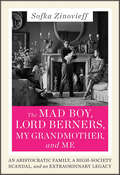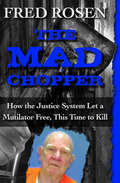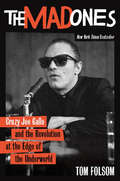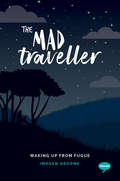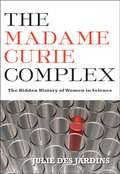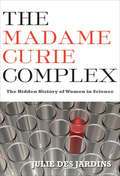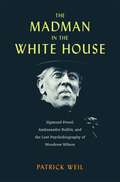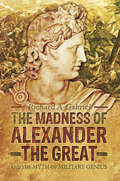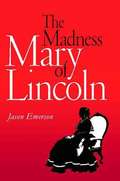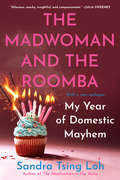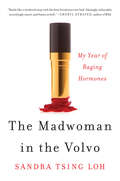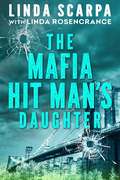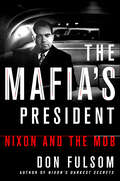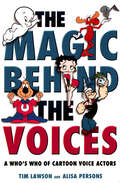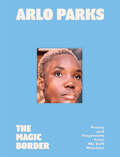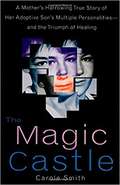- Table View
- List View
The Macneils of Tokyo
by Jack SewardIn the absorbing, epic tradition of The Winds of War, author Jack Seward presents a new novel of war, passion, and divided family loyalties. The MacNeil family is torn apart by the horrors of war, which is consuming Asia as strife, intrigue, and romance inevitably follow. Like its predecessor, The MacNeils of Nagasaki, this lively novel is a storytelling gem from a prolific author, a perfect beach read for all lovers of family sagas, historical fiction, and gripping adventure novels.
The Mad Boy, Lord Berners, My Grandmother, and Me: An Aristocratic Family, a High-Society Scandal, and an Extraordinary Legacy
by Sofka ZinovieffLike The Bolter and Portrait of a Marriage, this beguiling, heady tale of a scandalous ménage à trois among England's upper classes combines memoir and biography to re-create an unforgettably decadent world.Among the glittering stars of British society, Sofka Zinovieff's grandparents lived and loved with abandon. Robert Heber-Percy was a dashing young man who would rather have a drink than open a book, so his involvement with Jennifer Fry, a gorgeous socialite famous for her style and charm, was not surprising. But by the time Robert met and married Jennifer, he had already been involved with a man—Gerald, Lord Berners—for more than a decade.Stout, eccentric and significantly older, Gerald was a composer, writer and aesthete—a creative aristocrat most at home in the company of the era's best and brightest minds. He also owned one of Britain's loveliest stately homes, Faringdon House, in Oxfordshire, which under his stewardship became a beacon of sybaritic beauty. Robert and Gerald made an unlikely couple, especially because they lived together at Faringdon House when homosexuality was illegal. And then a pregnant Jennifer moved into Faringdon in 1942, creating a formidable ménage à trois.In this gorgeous, entertaining narrative of bohemian aristocracy, Sofka Zinovieff probes the mysteries of her grandparents and the third man in their marriage: Gerald, the complex and talented heir to a legendary house, its walls lined with priceless art and its gardens roamed by a bevy of doves, where he entertained everyone from Igor Stravinsky to Gertrude Stein. What brought Robert and Jennifer together under his roof, and why did Jennifer stay—and marry Robert? Blending memoir and biography in her quest to lay old ghosts to rest, Zinovieff pieces together the complicated reality behind the scandals of revelry and sexuality. The resulting story, defined by keen insight, deep affection and marvelous wit, captures the glory and indulgence of the age, and explores the many ways in which we have the capacity to love.
The Mad Chopper: How the Justice System Let a Mutilator Free, This Time to Kill
by Fred RosenThe author of the true crime &“masterpiece&” Lobster Boy traces a brutal killer&’s history across two decades of slipping past the legal system (The Guardian). When police in Tampa, Florida, arrested Larry Singleton in 1997 for brutally murdering prostitute Roxanne Hayes, they soon realized it wasn&’t the man&’s first violent attack. Back in 1978 he had gained notoriety as &“the Mad Chopper&” for raping and cutting off the arms of 15-year-old Mary Vincent on a patch of desolate, sun-scorched land 5 miles off the highway near Modesto, California. When Singleton was let out of prison on supervised parole after serving only 8 years for his crimes, no community in California would accept him. He eventually moved back to his home in Florida, where he killed Hayes nearly 20 years after his original crime. But his first victim, Vincent, had survived, walking nearly a mile to get help after the assault, and testified against him at his trial for murdering Hayes.
The Mad Ones: Crazy Joe and the Revolution at the Edge of the Underworld
by Tom FolsomA powerful collision of true crime and pop culture, The Mad Ones captures the revolutionary spirit of the sixties and brings to life one of the most vibrant antiheroes in American history.
The Mad Traveller: Waking up from Fugue (Inspirational Series)
by Imogen GroomeHow terrifying is it when you disappear from your everyday life and wake up somewhere else, without even knowing how you got there? That is the experience of someone with dissociative fugue – and that was the life Imogen Groome lived. A clever and quiet child, Imogen was marginalised and bullied at school. Sometimes she walked out of lessons, because she simply couldn’t cope; sometimes, something inside her woke up, and “The Mad Traveller” took over.Imogen was the girl who kept going missing. And as she struggled to deal with a life that just kept on getting harder, she zoned out more and more. But even when she found herself homeless in London, abused by the people she trusted, and forced to endure a life of compromise, Imogen never lost her faith in her ability to recover.The Mad Traveller is a very relatable story for anyone who has ever found themselves marginalised, alone or afraid. At its heart, this is a story for anyone who has ever dared to dream big.
The Madame Curie Complex: The Hidden History Of Women In Science
by Julie Des JardinsWhy are the fields of science and technology still considered to be the preserve of men? This work moves beyond the common explanations to give historical context and unexpected revelations about women's contributions to the sciences. Exploring the lives of Jane Goodall, Rosalind Franklin and the women of the Manhattan Project among many others, Des Jardins considers their personal stories in relation to their male counterparts to demonstrate how the gendered culture of science molds the methods and experience of the work.
The Madame Curie Complex: The Hidden History of Women in Science (Women Writing Science Ser.)
by Julie Des JardinsThe historian and author of Lillian Gilbreth examines the &“Great Man&” myth of science with profiles of women scientists from Marie Curie to Jane Goodall. Why is science still considered to be predominantly male profession? In The Madame Curie Complex, Julie Des Jardin dismantles the myth of the lone male genius, reframing the history of science with revelations about women&’s substantial contributions to the field. She explores the lives of some of the most famous female scientists, including Jane Goodall, the eminent primatologist; Rosalind Franklin, the chemist whose work anticipated the discovery of DNA&’s structure; Rosalyn Yalow, the Nobel Prize-winning physicist; and, of course, Marie Curie, the Nobel Prize-winning pioneer whose towering, mythical status has both empowered and stigmatized future generations of women considering a life in science. With lively anecdotes and vivid detail, The Madame Curie Complex reveals how women scientists have changed the course of science—and the role of the scientist—throughout the twentieth century. They often asked different questions, used different methods, and came up with different, groundbreaking explanations for phenomena in the natural world.
The Maddie Diaries: A Memoir
by Maddie ZieglerIn this New York Times bestselling memoir, the incredibly talented breakout star of Dance Moms and judge on So You Think You Can Dance brings her uplifting coming-of-age story about following her dreams and working hard to achieve success in both the dance world and in life.Maddie Ziegler knew one day she&’d be a star—she just didn&’t know how soon that day would come. At just eight years old, she was cast on Lifetime&’s hit reality show Dance Moms and quickly won the hearts of fans everywhere with her natural talent and determination. Soon, she was capturing attention from all over—including pop superstar Sia, who cast her as her dance double in the incredibly popular music video for her hit song &“Chandelier.&” The rest, as they say, was history. In this inspirational memoir, Maddie explains the hard work she put into her rise to stardom and how she keeps her balance along the way—starring in music videos, going on tour, and becoming an actress in The Book of Henry with Naomi Watts and Jacob Tremblay. She also answers her fans&’ burning questions with wise advice she&’s learned on her journey. With honesty, charm, and humor, Maddie offers her unique perspective on making her way in the entertainment world as a young teenager, reflecting on the lessons she&’s learned—and preparing for the exciting road ahead.
The Maddie Diaries: My Story
by Maddie Ziegler<P>Teen dance prodigy, breakout Dance Moms star, and judge on So You Think you Can Dance: The Next Generation, Maddie Ziegler presents her uplifting coming-of-age memoir about following her dreams and working hard to achieve success in both the dance world and in life. <P>Maddie Ziegler had hoped to become a star - she just didn't know how soon that day would come. At just eight years old, she was cast on the hit reality TV show Dance Moms and quickly won the hearts of fans everywhere with her natural talent and determination. Soon, she was catching eyes all over - including those of pop superstar Sia, who handpicked her to star in the incredibly popular music video 'Chandelier'. The rest, as they say, is history. <P> In this inspirational memoir, Maddie explains the hard work she put in to her rise to stardom and how she keeps her balance along the way - starring in music videos, going on tour and becoming an actress in The Book of Henry, with Naomi Watts and Jacob Tremblay. She also answers her fans' burning questions with wise advice she's learned on her journey. With honesty, charm and humour, Maddie offers her unique perspective on making her way in the world as a young teenager, reflecting on the lessons she's learned - and preparing for the exciting road ahead. <P><b>A New York Times Bestseller</b>
The Madman in the White House: Sigmund Freud, Ambassador Bullitt, and the Lost Psychobiography of Woodrow Wilson
by Patrick Weil“A rich study of the role of personal psychology in the shaping of the new global order after World War I. So long as so much political power is concentrated in one human mind, we are all at the mercy of the next madman in the White House.”—Gary J. Bass, author of The Blood TelegramThe notorious psychobiography of Woodrow Wilson, rediscovered nearly a century after it was written by Sigmund Freud and US diplomat William C. Bullitt, sheds new light on how the mental health of a controversial American president shaped world events.When the fate of millions rests on the decisions of a mentally compromised leader, what can one person do? Disillusioned by President Woodrow Wilson’s destructive and irrational handling of the 1919 Treaty of Versailles, a US diplomat named William C. Bullitt asked this very question. With the help of his friend Sigmund Freud, Bullitt set out to write a psychological analysis of the president. He gathered material from personal archives and interviewed members of Wilson’s inner circle. In The Madman in the White House, Patrick Weil resurrects this forgotten portrait of a troubled president.After two years of collaboration, Bullitt and Freud signed off on a manuscript in April 1932. But the book was not published until 1966, nearly thirty years after Freud’s death and only months before Bullitt’s. The published edition was heavily redacted, and by the time it was released, the mystique of psychoanalysis had waned in popular culture and Wilson’s legacy was unassailable. The psychological study was panned by critics, and Freud’s descendants denied his involvement in the project.For nearly a century, the mysterious, original Bullitt and Freud manuscript remained hidden from the public. Then in 2014, while browsing the archives of Yale University, Weil happened upon the text. Based on his reading of the 1932 manuscript, Weil examines the significance of Bullitt and Freud’s findings and offers a major reassessment of the notorious psychobiography. The result is a powerful warning about the influence a single unbalanced personality can have on the course of history.
The Madness of Alexander the Great: And the Myth of Military Genius
by Richard A. GabrielOver the years, some 20,000 books and articles have been written about Alexander the Great, the vast majority hailing him as possibly the greatest general that ever lived. Richard A. Gabriel, however, argues that, while Alexander was clearly a succesful soldier-adventurer, the evidence of real greatness is simply not there. The author presents Alexander as a misfit within his own warrior society, attempting to overcompensate. Thoroughly insecure and unstable, he was given to episodes of uncontrollable rage and committed brutal atrocities that would today have him vilified as a monstrous psychopath. The author believes some of his worst excesses may have been due to what we now call Post Traumatic Stress Disorder, of which he displays many of the classic symptoms, brought on by extended exposure to violence and danger. Above all the author thinks that Alexander's military ability has been flattered by History. Alexander was tactically competent but contributed nothing truly original, while his strategy was often flawed and distorted by his obsession with personal glory. This radical reappraisal is certain to provoke debate.
The Madness of Mary Lincoln
by Jason EmersonIn 2005, historian Jason Emerson discovered a steamer trunk formerly owned by Robert Todd Lincoln's lawyer and stowed in an attic for forty years. The trunk contained a rare find: twenty- five letters pertaining to Mary Todd Lincoln's life and insanity case, letters assumed long destroyed by the Lincoln family. Mary wrote twenty of the letters herself, more than half from the insane asylum to which her son Robert had her committed, and many in the months and years after. The Madness of Mary Lincoln is the first examination of Mary Lincoln's mental illness based on the lost letters, and the first new interpretation of the insanity case in twenty years. This compelling story of the purported insanity of one of America's most tragic first ladies provides new and previously unpublished materials, including the psychiatric diagnosis of Mary's mental illness and her lost will. Emerson charts Mary Lincoln's mental illness throughout her life and describes how a predisposition to psychiatric illness and a life of mental and emotional trauma led to her commitment to the asylum. The first to state unequivocally that Mary Lincoln suffered from bipolar disorder, Emerson offers a psychiatric perspective on the insanity case based on consultations with psychiatrist experts. This book reveals Abraham Lincoln's understanding of his wife's mental illness and the degree to which he helped keep her stable. It also traces Mary's life after her husband's assassination, including her severe depression and physical ailments, the harsh public criticism she endured, the Old Clothes Scandal, and the death of her son Tad. The Madness of Mary Lincoln is the story not only of Mary, but also of Robert. It details how he dealt with his mother's increasing irrationality and why it embarrassed his Victorian sensibilities; it explains the reasons he had his mother committed, his response to her suicide attempt, and her plot to murder him. It also shows why and how he ultimately agreed to her release from the asylum eight months early, and what their relationship was like until Mary's death. This historical page-turner provides readers for the first time with the lost letters that historians had been in search of for eighty years.
The Madness of Ushers: Coping with Vision and Hearing Loss (Usher Syndrome Type II)
by Dorothy H. StiefelThe author allows the reader to enter her personal "twilight zone," an inconsistent world of grayness brought on by the dual disability of hearing and sight loss. She uses specific events in her life to show the reader with these disabilities that they are not alone in fighting despair and confusion. Statements from others who have faced Usher syndrome and retinitis pigmentosa lend credence to the author's message: "giving up is not an answer." Recommended reading for family members and friends, professionals in the field, and persons with retinitis pigmentosa and Usher syndrome. -Linda Lindell, Information and Referral Coordinator Texas State Library Program for the Blind and Physically Handicapped
The Madwoman and the Roomba: My Year Of Domestic Mayhem
by Sandra Tsing LohA comic exploration of a year in the life of an “imaginatively twisted and fearless” (Los Angeles Times) best-selling author. Ah, 55. Gateway to the golden years! Professional summiting. Emotional maturity. Easy surfing toward the glassy blue waters of retirement…Or maybe not? Middle age, for Sandra Tsing Loh, feels more like living a disorganized 25-year-old’s life in an 85-year-old’s malfunctioning body. With raucous wit and carefree candor, Loh recounts the struggles of leaning in, staying lean, and keeping her family well-fed and financially afloat—all those burdens of running a household that still, all-too-often, fall to women. The Madwoman and the Roomba chronicles a roller coaster year for Loh, her partner, and her two teenage daughters in their ramshackle quasi-Craftsman, with a front lawn that’s more like a rectangle of compacted dirt and mice that greet her as she makes her morning coffee. Her daughters are spending more time online than off; her partner has become a Hindu, bringing in a household of monks; and she and her girlfriends are wondering over Groupon “well” drinks how they got here. Whether prematurely freaking out about her daughters’ college applications, worrying over her eccentric aging father, or overcoming the pitfalls of long-term partnership and the temptations of paired-with-cheese online goddess webinars, Loh somehow navigates the realities of what it means to be a middle-aged woman in the twenty-first century. By day’s end, we just might need a box of chardonnay and a Roomba to clean up the mess.
The Madwoman in the Volvo: My Year of Raging Hormones
by Sandra Tsing LohFrom an "imaginatively twisted and fearless" writer (Los Angeles Times), a hilarious memoir of middle age. In a voice that is wry, disarming, and totally candid, Sandra Tsing Loh tells the moving and laugh-out-loud tale of her roller coaster through "the change." This is not your grandmother's menopause story. Loh chronicles utterly relatable, everyday perils: raising preteen daughters, weathering hormonal changes, and the ups and downs of a career and a relationship. She writes also about an affair and the explosion of her marriage, while managing the legal and marital hijinks of her eighty-nine-year-old dad. The upbeat conclusion: it does get better.
The Madwoman in the Volvo: My Year of Raging Hormones
by Sandra Tsing LohIn a voice that is wry, disarming, and totally candid, Sandra Tsing Loh tells the moving and laugh-out-loud tale of her roller coaster through "the change." This is not your grandmother's menopause story. Loh chronicles utterly relatable, everyday perils: raising preteen daughters, weathering hormonal changes, and going through the ups and downs of a career and a relationship. She writes also about an affair and the explosion of her marriage, the pressures of keeping her daughters off Facebook while managing the legal and marital hijinks of her eighty-nine-year-old dad, and a despairing withdrawal to a tiny cabin where she combined wine and Ambien, paralyzing her arm into a claw. In one outrageous chapter, a hormonal Loh finds herself trekking to her preteen daughter's school to confront a ten-year-old bully half her size. In another she attempts to subsist on only zero-calorie noodles and the occasional fat-free yogurt in a hopeless effort to vanquish added midlife weight. In The Madwoman in the Volvo Loh speaks hilariously and honestly about her life as a mother, a daughter, and an artist. She recounts her journey through a tumultuous time of life, trying to maintain appearances during an epic hormonal--and that means physical, emotional, mental, and spiritual--change. The upbeat conclusion: it does get better.
The Mafia Chronicles: Autobiographies of a Mafia Hit Man
by David Fisher Joey the Hit ManA New York Times bestseller, the “chilling and compelling . . . must-read” confessions of a mob hit man—and the riveting sequel of his most harrowing contract (former FBI agent Joe Pistone, aka Donnie Brasco). Killer: The Bronx-born son of a Jewish bootlegger, “Joey the Hit Man” was introduced to crime when he was just eleven years old. For the next thirty years he was a numbers king, scalper, loan shark, enforcer, and drug smuggler. He hijacked trucks, fenced stolen goods, and trafficked in pornography. But Joey really made his name as a Mafia assassin, racking up thirty-eight cold-blooded hits—thirty-five for cash, three for revenge. In this no-holds-barred account, he reveals the brutal truth of a life in organized crime. Hit #29: In the fall of 1969, a public execution in a Brooklyn Italian restaurant earned Joey a mention in the New York Daily News and a twenty-grand payout from the mob. Next up: The bosses suspected their trusted numbers controller, Joe Squillante, was skimming the nightly bets to settle personal debts. But Squillante, aka Hit #29, was no clueless patsy and an unpredictable bull’s-eye. Taking the job meant entering into a game of predator and prey as nerve-racking as the cock of a .38 hammer.
The Mafia Hit Man's Daughter
by Linda Rosencrance Linda Scarpa“A riveting look at life inside a Mafia family.”—New York Times bestselling author George AnastasiaThe world called him a killer. She called him Dad . . .“We were always worried. Always looking over our shoulders . . .”Linda Scarpa had the best toys, the nicest clothes, and a close-knit family. Yet classmates avoided her; boys wouldn’t date her. Eventually she learned why: they were afraid of her father.A made man in the Colombo crime family, Gregory Scarpa, Sr. was a stone-cold killer nicknamed the “Grim Reaper.” But to Linda, he was also a loving, devoted father who played video games with her for hours. In riveting detail, she reveals what it was like to grow up in the violent world of the mob and to come to grips with the truth about her father and the devastation he wrought.“An amazing story of jealously, duplicity, hatred and betrayal.”—Sal Polisi, author of The Sinatra Club “Touching, shocking, revealing—Linda Scarpa’s memoir is more than a mob book; it’s a family book.”—John Alite, subject of Gotti’s Rules “An edge-of-your-seat page turner—jaw-dropping, raw, and real.”—Andrea Giovino, author of Divorced From the Mob INCLUDES 16 PAGES OF DRAMATIC PHOTOS[color photo inserts for ebook editions]
The Mafia's President: Nixon and the Mob
by Don FulsomThe first-ever full account of Nixon's extensive ties to the American Mafia, from a veteran White House reporter.Unbeknownst to most people even now, the election of 1968 placed the patron saint of the Mafia in the White House. In other words, Richard Nixon would go on to not only lead a criminal presidency; he would be totally indebted to our nation’s top mobsters.By 1969, thanks in large part to his long-time campaign manager and political advisor Murray Chotiner, a lawyer who specialized in representing mobsters, Nixon had participated in secret criminal dealings for more than 20 years with sketchy figures such as Mickey Cohen, Mob financial guru Meyer Lansky, Teamsters union chief Jimmy Hoffa, and New Orleans Mafia boss Carlos Marcello. And with Chotiner as one of his key behind-the-scenes advisors in the White House, Nixon's ties to the Mafia didn't end there. The Mafia’s President reveals a mind-blowing litany of favors Nixon exchanged with these sinister characters over decades, ranging from springing Jimmy Hoffa from prison to banning the federal government from using the terms “Mafia” and “La Cosa Nostra.”Drawing on newly released government tapes, documents, and other fresh information, The Mafia’s President by Don Fulsom offers a carefully reported, deeply researched account of Richard Nixon’s secret connections to America’s top crime lords.
The Magic
by Dan RhodesDan Rhodes is one of the most successful and beloved YouTuber and TikTok influencers in the world with more than 5 billion views on YouTube and the most viewed personal post ever - over 300 million views - on TikTok.In this, his debut book, Dan brings together the love and joy he has continually derived from magic - from the very first moment he received a magic kit from his parents when he was six years old setting him on his journey from amateur magician to global TikTok and YouTube star - and the book also gives tips and insights into how you could become a social media inspiration too.With striking illustrations throughout and clear 'trick guides' to help young magicians get started - along with some really impressive sleights of hand for the more experienced illusionist - Dan's book also contains a fascinating history of the craft of the magician, highlighting the skill and dedication it takes to become a true master.
The Magic
by Dan RhodesDan Rhodes is one of the most successful and beloved YouTuber and TikTok influencers in the world with more than 5 billion views on YouTube and the most viewed personal post ever - over 300 million views - on TikTok.In this, his debut book, Dan brings together the love and joy he has continually derived from magic - from the very first moment he received a magic kit from his parents when he was six years old setting him on his journey from amateur magician to global TikTok and YouTube star - and the book also gives tips and insights into how you could become a social media inspiration too.With striking illustrations throughout and clear 'trick guides' to help young magicians get started - along with some really impressive sleights of hand for the more experienced illusionist - Dan's book also contains a fascinating history of the craft of the magician, highlighting the skill and dedication it takes to become a true master.
The Magic Apple Tree: A Country Year
by Susan HillLooking out from Moon Cottage, Susan Hill records the sights and smells, the people, gardens, animals, births, festivals and deaths that mark the changing seasons in the small Oxfordshire community over a year.
The Magic Behind the Voices: A Who's Who of Cartoon Voice Actors
by Tim Lawson Alisa PersonsThe Magic Behind the Voices is a fascinating package of biographies, anecdotes, credit listings, and photographs of the actors who have created the unmistakable voices for some of the most popular and enduring animated characters of all time. Drawn from dozens of personal interviews, the book features a unique look at thirty-nine of the hidden artists of show business. Often as amusing as the characters they portray, voice actors are charming, resilient people—many from humble beginnings—who have led colorful lives in pursuit of success. Beavis and Butthead and King of the Hill's Mike Judge was an engineer for a weapons contractor turned self-taught animator and voice actor. Nancy Cartwright (the voice of Bart Simpson) was a small-town Ohio girl who became the star protégé of Daws Butler—most famous for Yogi Bear, Huckleberry Hound, and Quick Draw McGraw. Mickey Mouse (Wayne Allwine) and Minnie Mouse (Russi Taylor) were a real-life husband-and-wife team. Spanning many studios and production companies, this book captures the spirit of fun that bubbles from those who create the voices of favorite animated characters. In the earliest days of cartoons, voice actors were seldom credited for their work. A little more than a decade ago, even the Screen Actors Guild did not consider voice actors to be real actors, and the only voice actor known to the general public was Mel Blanc. Now, Oscar-winning celebrities clamor to guest star on animated television shows and features. Despite the crushing turnouts at signings for shows such as Animaniacs, The Simpsons, and SpongeBob Squarepants, most voice actors continue to work in relative anonymity. The Magic Behind the Voices features personal interviews and concise biographical details, parting the curtain to reveal creators of many of the most beloved cartoon voices.
The Magic Border: Poetry and Fragments from My Soft Machine
by Arlo ParksFrom Arlo Parks, Grammy Award-nominated recording artist and “voice of a generation”—a stunning debut book of poetry and a world-building companion to her sophomore album My Soft Machine.“Poetry was my place, my little clearing in the forest, where I could quietly put everything I was holding. I’m not sure what gave me the courage to open up that space to you but here I am, doing it. I am proud to show you this personal lens that life shimmers through. This book is no longer mine. It is yours.”—Arlo ParksThe Magic Border is the debut book from the Grammy-nominated, Mercury Prize winning musician and poet Arlo Parks. This remarkable collection features Arlo’s handpicked original poems alongside exclusive photographs by friend and collaborator Daniyel Lowden in addition to the complete lyrics to her critically lauded sophomore album My Soft Machine. A deeply personal literary tapestry, The Magic Border beautifully showcases the full breadth of Arlo’s singular artistry.
The Magic Castle: A Mother's Harrowing True Story of Her Adoptive Son's Multiple Personalities and the Triumph of Healing
by Carole Smith"This is a true account of my experiences in successfully raising a child who suffered from multiple personality disorder. In writing the book, I have made extensive use of notes I took during therapy sessions and directly after encounters with alters, mental health personnel, a child placement organization, and the office of the district attorney. Occasionally, I have combined several similar events to avoid repetition. I was not present at the original incidents but I did observe many revivifications of the actual events. My belief in the truth of the personalities' revelations is based upon physical and circumstantial evidence and also occasional verification from witnesses. All of my encounters with the alters, including revivifications, have been accurately depicted and have not been exaggerated in any way. Many names, locations, and identifying details, including those of my family, have been changed or modified. The only names used in this book that have not been altered are those of Bill Conti, Dr. Steven J. Kingsbury, Dr. Nina Fish-Murray, Marie Párente, and Dr. Van der Kolk. The names of places and institutions that have not been changed are Boston Children's Hospital; Camp Wedicko; County District Attorneys Office; Massachusetts Department of Social Services; Massachusetts Mental Health Center; Mount Auburn Hospital; Northboro, Massachusetts; Robert F. Kennedy Residential School; and University of Massachusetts Acute Adolescent Psychiatric Unit at Westboro. As a final note, when he was thirteen years old, my son wanted to sever all connections to the perpetrators and asked to have his first, middle, and last names changed. I gave him an old family name of mine, my husband's middle name, and, of course, our last name. It is important that the reader know of these changes. However, throughout this book I have simply called him Alex."

